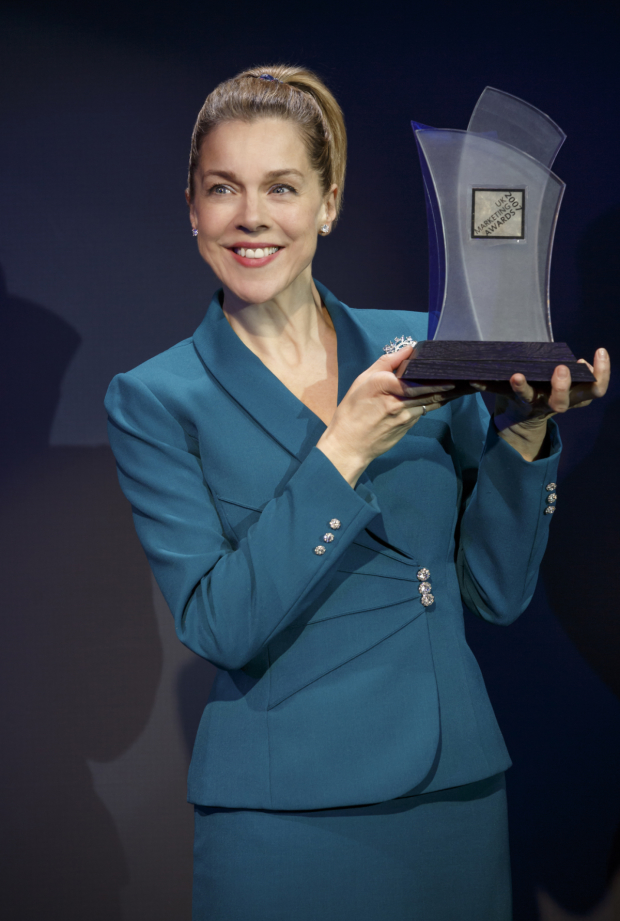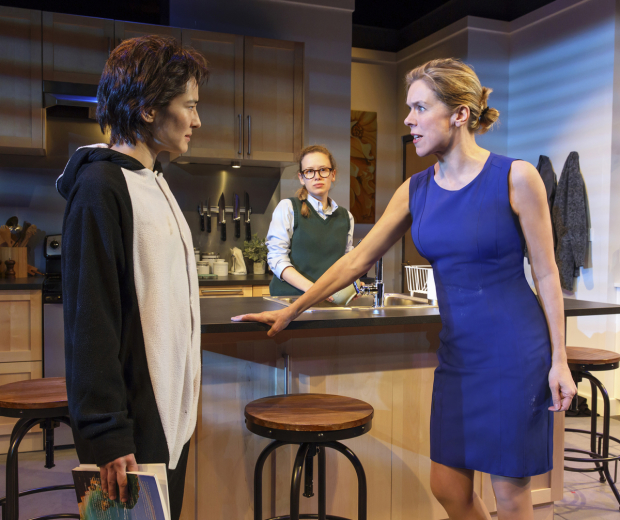Linda

(© Joan Marcus)
Can a woman in her 50s have it all? That's the question at hand in Linda, Penelope Skinner's latest play at Manhattan Theatre Club's New York City Center – Stage I. Linda, the title character, has built herself up to the top of her game. At 55, she's an award-winning cosmetics pioneer and senior executive who still manages to find the time to cook and clean for her husband and two daughters. However, the cracks are starting to show. Her older (adult) daughter refuses to stop wearing her skunk onesie. Her husband is suddenly in a rock band fronted by a beautiful 30-year-old. And that new girl at work is gaining traction with the boss suspiciously fast for someone in her 20s. Soon, Linda finds herself facing an uphill battle she never expected: the one for relevance.
Linda, which premiered at London's Royal Court in 2015, makes its American debut at a fortuitous time in our country's history, when a great many people are still smarting from the first female presidential candidate's failed campaign to win the highest office in the land. In that respect, this production, appropriately directed like a suspense thriller by MTC artistic director Lynne Meadow, is timely to an almost astonishing degree. Chock-full of a great many incredibly exciting moments (and two electrifying central performances from Janie Dee and Molly Griggs), Linda comes close to being the real deal, but ultimately sinks under the weight of its own admittedly impressive ambition.
When we first meet Linda (magnetically played by Dee, an Olivier-winning West End regular), she's delivering the pitch of her career. Her company's new antiaging cream, she dreams, will be geared toward women her age, a far-too-underrepresented market in a field where youth is prized, and the only older person who seems to get work is Helen Mirren. But the company is planning to use someone else's marketing plan, one hatched by 25-year-old Amy (Griggs) that caters to the under-30 market.

(© Richard Termine)
What follows can only be described as a downward spiral. As much as Linda wants to admit that everything in her life is hunky-dory, she's closed her eyes to some potentially lethal situations at home. Her husband, Neil (Donald Sage Mackay) has been spending more and more time with his new bandmates, including the fetching and much younger Stevie (Meghann Fahy). Alice (Jennifer Ikeda), her twentysomething daughter who still lives at home and prowls around in that skunk costume, was damaged by an event years earlier that she believes her mother turned a blind eye toward. Her younger daughter, Bridget (Molly Ranson), is auditioning for drama school and needs help finding a good Shakespearean monologue. As for Amy, she just can't believe that a person she admired as much as she idolized Linda could turn out to be so adversarial.
With more than a few shades and allusions to Shakespeare's King Lear, Linda is in a battle to regain footing in her own life after making a series of spectacularly miscalculated decisions at work and at home. Echoing Lear's descent into madness (down to a climactic "breakdown in a storm" sequence), Skinner charts a meltdown of epic proportions for her title character that only distracts from the topic at hand rather than illuminates it.
Fortunately, Dee's performance saves the day, a masterfully clear-cut, magnetic turn as a woman willing to do just about anything to keep the status she has worked so hard to achieve. Griggs is every bit as flawless as Dee, expertly playing a snake in the grass who has ruined more than one person's life in her few decades on earth, but who still manages to elicit sympathy from the audience. On Walt Spangler's revolving set, which takes us back and forth between Linda's well-appointed home and sleek office (with the occasional thunder crack thrown in by sound designer Fitz Patton), their work together is pretty rollicking melodrama in Meadow's hands.
With the exception of Ikeda, whose big second-act moment is truly shocking, the rest of the company fares less well, stuck in the middle of overstuffed story lines that don't really go anywhere. Still, so much of the experience is fitfully exciting and thought-provoking enough that Linda sticks with you after the curtain comes down. Maybe in theater, as in life, we can't have it all, but we can come awfully close.










